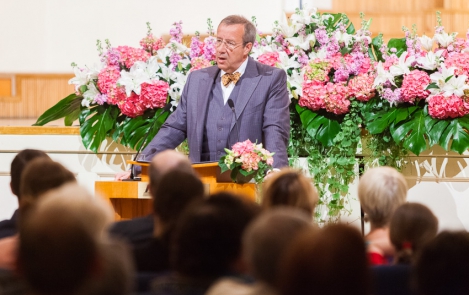-
Reset
+


President Toomas Hendrik Ilves on Mother’s Day 12 May 2013 at the Estonia Concert Hall
12.05.2013
Fellow countrymen,
Mothers and grandmothers,
Today is the day we – brothers and sisters, fathers and husbands – declare our love and gratitude for you!
We show our respect for the selfless and never-ending warmth and care amidst which we were born, have grown up and lived.
We say thank you, we congratulate you and wish you good health!
At the same time, Mother's Day is the day when all of us as children, husbands and fathers, citizens and state representatives should think of the true meaning of being a mother – the loving, caring and fostering all human beings need from the cradle to the grave.
Maternal nature is about caring for everything that makes life humanely profound and meaningful. This has been given to each mother by nature and is thus genuine. But it is also written in law.
Fellow countrymen,
In the last few weeks we have actively debated a rather sensitive subject in Estonia. We have been talking about those people for whom being a mother and a child has become an economic, physical and foremost mental burden.
We are talking about taking care of our loved ones. We are talking about those families where pain and worry exist alongside joy, where caring for a sick child or old mother or father becomes a full-time job – a job without pay.
This subject is so painful and so important that we must talk about it honestly. We must say how things are.
By doing so we see how discussions are full of traditions, about how it has been customary for Estonian families to act in different times. And also the changes in family models, economic opportunities and options offered by a free society.
This discussion includes attitudes and views which sadden me. I am disturbed by simplistic conclusions, for example that assisted death could lessen the burden of the caretakers and the ones being cared for.
I am disturbed by the simplified proposal that only the state is obliged to take care of the old and the sick. But I am also troubled by those who think that families should assume full responsibility.
We need no confrontation which says that we have the person needing care on one side and the anonymous, mean and non-caring state on the other.
Such confrontation does not lead us anywhere and I am afraid we might lose a good opportunity to change something. Even in the most successful states and societies, many times wealthier than Estonia, taking care of the old, weak and sick is a shared concern and responsibility.
High-level retirement pensions, caregiver's allowances, rehabilitation and dignified nursing homes are often the result of shared responsibility elsewhere in the world too. The support given by the state and local governments to the elderly is supplemented by the pension collected from people's life-long work as well as their own savings, should they have them, but also insurance, funds, charity and the church. Yes, it all costs and not just a little – the more time passes, the more it costs. Just like busses cannot be provided at no cost or higher education free of charge, the solutions in the social sphere are not free either – anywhere.
Let us consider, as elections are getting closer, whether our joint contribution is enough for aid and relief. Do we need more? Are we willing to make a bigger contribution?
Let's use the time and attention we have now to discuss this.
Dear mothers and grandmothers,
Today's speech was perhaps too serious for this festive day.
But without discussing and talking about these difficult issues, talking about the holiday and about the caring and love of mothers is not sincere and fully credible.
Motherly care and fostering has no price: it is altruistic. But no one, especially the state, has the right to ignore the burden of all caretakers of mothers and other people – yours in this hall as well as the care and effort of tens of thousands of people elsewhere.
In reality this has a common denominator – love and humanity. The one that you, mothers and grandmothers, have taught us and provided for our lives – what we cherish and appreciate as children. All of this surrounds us as homely warmth, food, encouraging or comforting words and in a thousand other ways.
For this I thank you, once again, from the bottom of my heart, and wish all mothers and grandmothers a wonderful day! Thank you.




